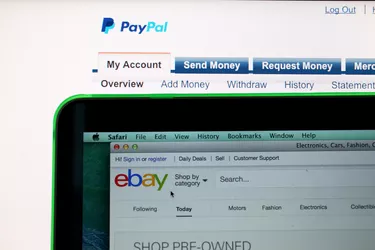
The Internal Revenue Service wants to know about all income you receive throughout the year, not only income from a traditional job but also money you make on your own as well. If you sell items on eBay, you are paid through PayPal; in addition, many freelancers, consultants or self-employed business owners also accept payment through PayPal. You are required to report all such earnings in your annual income tax return and pay the appropriate taxes on them.
Self-Employment Income
Video of the Day
Many people accept payment for their contracting or freelance work through PayPal. For instance, freelance artists and writers, auto mechanics, and landscapers, to name just a few, often accept PayPal payments, both from individual clients and from large companies. If you receive more than $600 in payments from any one client, regardless of how the money is paid to you, that client is required to prepare a Form 1099 tax information document, which it provides to you and to the IRS. The specific form used for contractors and freelancers is Form 1099-MISC.
Video of the Day
Form 1099-K
Recognizing the increasing reliance on PayPal, the IRS instituted special reporting requirements for those transactions. A Tax Code regulation implemented in 2012 requires PayPal and other third-party payment processors to file a Form 1099-K for all account-holders who receive $20,000 or more in payments spread out over 200 or more transactions during the year. One of the IRS' objectives in instituting this regulation was to bring previously unreported income under the tax umbrella by requiring taxpayers to account for income for which they haven't received a Form 1099. Much of the income reported on a Form 1099-K, though, may also have been reported on multiple Forms 1099 from various payers. Taxpayers should thus keep meticulous records of the income they receive through PayPal to avoid paying tax twice on the same amounts.
Business Income
Many people who run small businesses derive part of their income through PayPal payments. It is often much easier for individuals and other small businesses to pay through PayPal, and Paypal can also be preferable to a standard merchant account for online purchases. No matter what percentage of your business comes from PayPal, it is important to carefully track all of the expenses associated with that income. Tracking everything you spend to run your business will make it much easier to prepare your tax return and get the deductions you deserve. You can use a spreadsheet if you want, or you can purchase a small business accounting program. But no matter which method you use, you need to keep all of your receipts in case the IRS challenges or questions a deduction on your tax return.
Track Costs
It's rare that business income you receive through your PayPal account is always pure profit. If you are a seller on eBay for instance, you have expenses such as listing fees and final value fees, as well as the original cost of the items you sold. If you are a freelance worker or someone who runs a home business, you might be able to write off the cost of your home office, your Internet service, your office supplies and other legitimate business expenses.
If you receive part of your income through your PayPal account, now is the perfect time to start tracking your expenses as well as your payments. Keep a spreadsheet that lists the original purchase price of each item you sell on eBay, along with the listing fees and final value fees. Also track any fees PayPal takes out of your account, since all of these items can be deducted when you do your taxes.